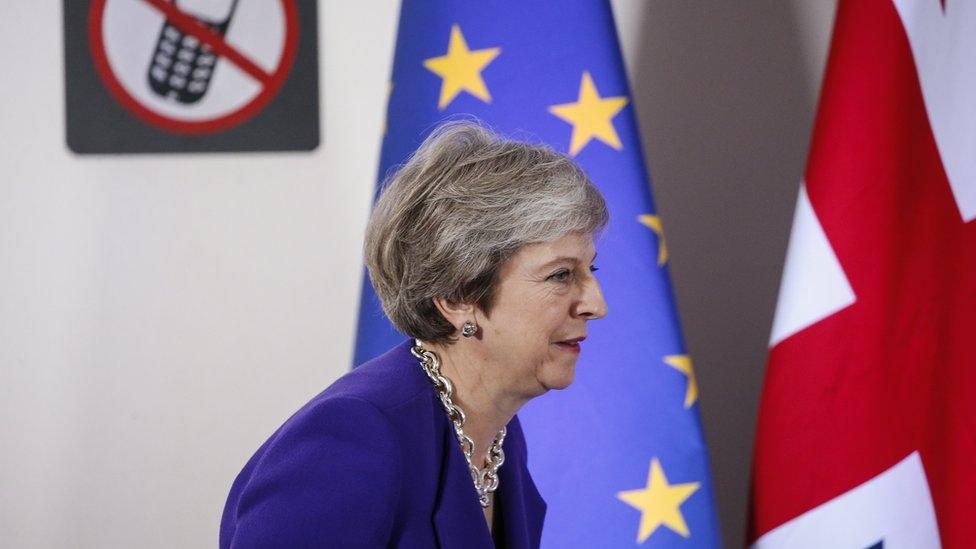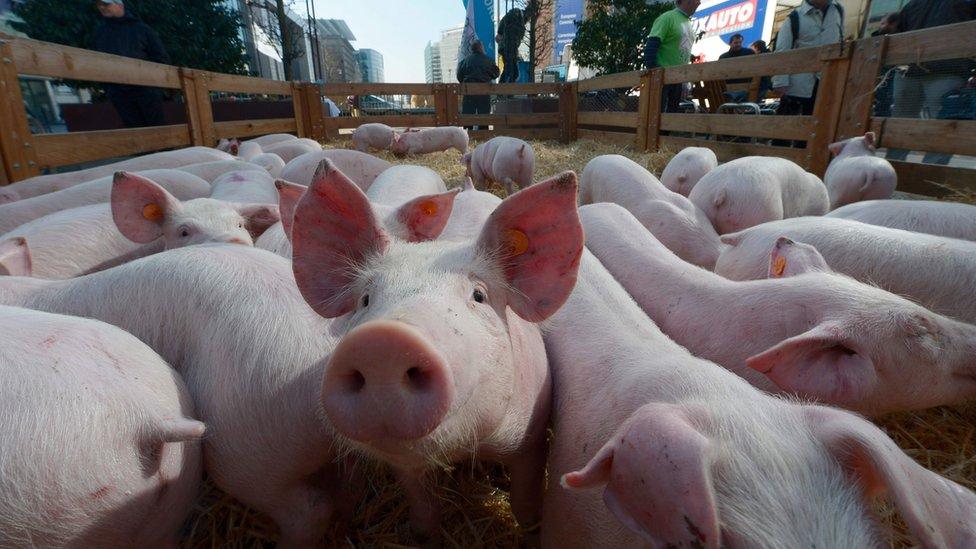Week ahead in the European Parliament
- Published

MEPs will get a chance to react to last week's inconclusive EU summit when they meet in Strasbourg this week.
The second plenary sitting of the month will allow them to react formally to the idea that the UK's post-Brexit transition period could be extended.
An extension for a "few months" has been suggested by Theresa May as an option to break the impasse over a backstop deal for the Irish border.
It has riled Brexit-backing Conservative MPs - but although MEPs are likely to find the idea less offensive, they might not be wild about it either.
Any extension beyond the current end date of December 2020 would reach into the timescale of the EU's next long-term budget - in which MEPs have previously called , externalfor "all rebates", including the UK's, to be abolished.
A key question to be answered now is whether an extension would incur additional budget contributions from the UK - and if so, how much?
MEPs will also debate and vote on a report from one of the assembly's committees into the Facebook-Cambridge Analytica data scandal.
The lengthy draft contains a number of recommendations for future regulation of social media platforms and combating 'fake news' online.
And on Tuesday, MEPs will decide whether to push for an EU-wide ban on certain single-use plastics to be widened.
Here's what's coming up this week...
Monday
First up is a debate on the forthcoming summits in Poland and Egypt on climate change and biological diversity.
After this MEPs will debate their position on next year's EU budget, ahead of negotiations with national ministers later this year.
As they normally do, they have so far called for cuts proposed by national governments to the European Commission's draft, external to be reversed.
The exact position they will take into talks will be decided on Tuesday, with a vote on a motion from the budgets committee.
The final deal hammered out behind closed doors will have to be ratified by the whole assembly before it can come into force.
Then they will discuss new EU-wide limits on the amount of lead and other chemicals in tap water, to be put to a vote on Tuesday.

The ban on plastic straws is part of a drive to protect marine life
The day's main legislating will be on the European Commission's proposed ban on single-use plastics such as straws.
On Wednesday, they will decide whether to back amendments to extend the ban to lightweight carrier bags and polystyrene takeaway boxes.
The environment committee also wants to see new labelling requirements for products such as cigarette filters and drinks cups.
Tuesday
The day begins with a debate on the Facebook-Cambridge Analytica data scandal, which has been investigated by MEPs on the civil liberties committee.
Their report, external, to be put to vote on Thursday, contains a number of policy recommendations on the subjects of data protection, 'fake news' and the use of information online for political profiling - of which more later.
One key question for MEPs to consider is whether their calls will be heard at the European Commission, responsible for new EU regulations.
Another issue which is bound to get an airing is how best to tackle misinformation online ahead of next year's European elections.

Facebook has set up a 'war room' to monitor posts ahead of next month's US elections
After this, Romanian President Klaus Iohannis will make a speech on the future of the EU - the eleventh leader to do so in a planned series.
After the lunchtime voting session, the European Commission will announce its legislative agenda for next year.
The scope for pushing through new legislation is more limited than usual next year is more limited due to European elections in May.
After this, MEPs will debate the killing of Saudi journalist Jamal Khashoggi.
The case has led to calls for Western nations to re-examine their relationship with Saudi Arabia, which is accused of being behind his disappearance.
After this they will debate the growing tensions between Ukraine and Russia in the Sea of Azov, and the economic crisis in Venezuela.
More than two million Venezuelans have fled their country since 2014. They have topped the list of asylum requests in Spain for three years.
Later they will debate three regulations to update the information sharing system used by police forces in the passport-free Schengen area.
Under the changes, facial images will be able to be shared to identify people, as well as fingerprints discovered at the scene of serious crimes or terror attacks.
A provisional deal on the changes MEPs agreed with EU governments in June faces a final vote on Wednesday.
The overhaul has been proposed as part of a bid to tighten up the EU's external borders.
Wednesday
Discussion of last week's EU summit is first up from 08.00 BST - European Council President Donald Tusk is due to speak at the start of the debate.
Aside from Brexit, MEPs may want to highlight progress - or lack of it - in the fields of migration policy, security and climate change.
At the voting session they may vote to sign off spending during 2016 by the EU's asylum support office.
They refused to do this in April, partially because an investigation into several of the agency's managers from the EU's anti-fraud watchdog was ongoing.
The Malta-based agency appointed an interim boss in June after its previous executive director resigned amid procurement and bullying scandals.
After lunch, things will get a bit institutional, with a "topical" debate on the future of the 2009 Lisbon Treaty.
Among other changes, the treaty handed greater powers to the European Parliament and introduced a new system for 'qualified majority' voting.
Treaty change is not exactly imminent, although some believe a constitutional refresh is needed as the EU grapples with new political challenges.
After this there is the traditional autumn debate on the annual report from the EU's main auditing authority, released earlier this month, external.
The European Court of Auditors (ECA) has found that 2.4% of EU funds were mis-spent during 2017.
That's a drop on the 3.1% figure recorded for spending in 2016, but still above the ECA's 2% target.
Then MEPs will debate new EU-wide import rules and licensing requirements for artefacts. They will take an initial position on the proposals on Thursday.
The European Commission announced the new rules last year to stop the trade in looted artefacts being used to fund terrorist and criminal groups.
Aside from specific measures covering Iraq and Syria, the EU currently lacks common procedures for licensing the import of artefacts from outside the bloc.
Some art dealers' associations have expressed concern that the new regulations will harm the art trade.
In the evening they will also discuss new restrictions on the use of antibiotics on groups of farm animals.

The widespread use of antibiotics on farm animals has led to a decline in their effectiveness
Under new legislation, treating an entire group of animals with antibiotics when only one has shown signs of infection will require prior authorisation from a vet.
They will also discuss legislation to phase in a ban on time-based road toll charges.
Operators would have to switch to distance-based charging for trucks and buses from 2023.
Thursday
There will be no debates on topical human rights motions, with the month's batch already having been voted on during the plenary sitting earlier this month.
Instead there will be debates on three "own initiative" reports from committees with policy recommendations for the European Commission.
This includes one calling for EU funds not be transferred outside the bloc through banks operating in "non-transparent and uncooperative jurisdictions".
The move is recommended as part of a report on tackling fraudulent spending of EU money by organisations around the world.
At the voting session MEPs will adopt motions on the disappearance of Jamal Khashoggi, Sea of Azov tensions and situation in Venezuela.
They will also vote on the final report into the Facebook-Cambridge Analytica scandal, likely to be an indicator of the future direction in which regulatory winds many blow for the platform and social media companies more generally.
The headline accusation in the draft version is that Facebook breached EU law during the scandal due to its role as a data "controller".
The report itself does not have a legal effect but will undoubtedly ratchet up the political pressure on the website over privacy issues.
It says that in future, users should have to consent specifically to their data being used for different purposes - and calls for new transparency measures for political adverts Facebook has introduced in the US to be rolled out in Europe.
In addition, it urges a ban on profiling socio-economic or demographic data online for political or electoral purposes.
Again - these ideas are only recommendations at this stage. But will it provide a taste of what is to come?
Please note: This agenda is subject to modification at the opening of the session on Monday afternoon.
A guide to the European Parliament's plenary sessions can be found here.